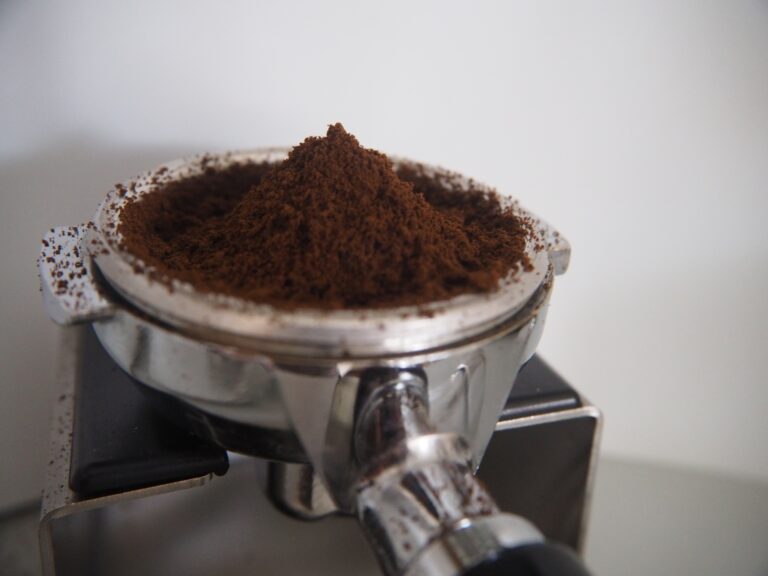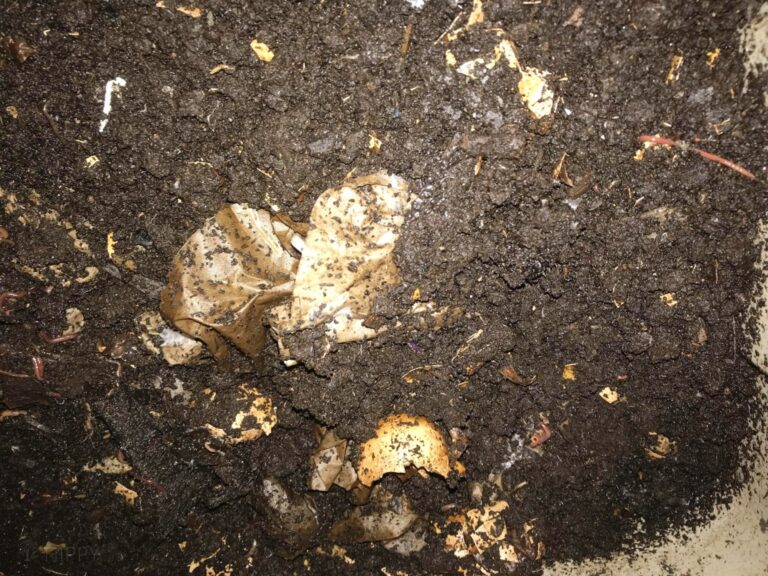When you visit a link in this article that takes you to a different website where you can purchase something, I may earn a commission. Read my full disclosure for more details.
Have you given much thought to your coffee grounds? They can make a great cup of coffee but what about beyond your morning coffee?

A lot of us drink coffee in the morning. We like to use an old fashioned percolator. There are people who drink coffee all day, and use keurig coffee pods.
And, those one cup coffee makers are a big thing, too. Just one cup of coffee at a time and it reduces waste. Either way, there are coffee grounds used.
A flavorful hot beverage is made. Sometimes, the coffee grounds are just tossed in the garbage without another thought.
It turns out there is much more to coffee grounds than just a hot beverage. They are actually very beneficial in the garden.
So before you throw out those coffee grounds, check out these seven creative uses for coffee grounds in the garden…
What to Know About Coffee Grounds
Many coffee drinkers are unaware of the benefits that coffee grounds can have in the garden.
Used coffee grounds can improve soil structure, provide nutrients, and even repel pests. Coffee grounds contain about 2% nitrogen, which can be helpful for plants that need a boost of this essential nutrient.
In addition, coffee grounds are close to pH neutral, making them a good choice for those who want to avoid adding too much acidity to their soil.
Finally, coffee grounds can also help to repel certain pests, making them a natural and effective way to keep your garden healthy.
How to Add Coffee Grounds to the Garden
Coffee grounds are a versatile gardening tool that can be used in a variety of ways. One of the most popular uses for coffee grounds is adding them to compost.
This helps to improve drainage and aeration, while also providing a boost of nutrients for plants.
Coffee grounds can also be spread directly on the soil, then covered with mulch or cultivated in. This helps to reduce weed growth and hold moisture in the soil.
If coffee grounds are left to dry, they can actually repel water, so it is important to keep this in mind when using them in the garden. However, coffee grounds will not go bad, so they can be stored for future use.
Overall, coffee grounds are an easy and effective way to improve your garden.
Coffee Grounds Garden Uses
Repel Pests
No one wants pests such as ants, snails, or slugs. In the garden, they can be destructive. To keep these critters away, sprinkle coffee grounds around your plants. Just a light sprinkling around the base is fine. Repeat after a heavy rain.
Speed Up Your Composting
We use a lot of chicken poop in our compost. Kitchen scraps, especially coffee grounds, work wonders in speeding up the compost process.
They are high in carbon, which helps to break down leaves and other “brown” compost material.

Our coffee grounds will often go into our compost bucket and are just regularly dumped with other scraps. The chickens scratch through the grounds to find what they want.
Feed the Worms
Worms find coffee grounds to be a particularly tasty treat. Having worms in your garden is good for plants. They help provide nutrients for the plants and keep the soil area fed. Coffee grounds attract them and help them thrive.
Use Them To Help Brighten Blossoms
Acid-loving plants such as hydrangeas, rhododendrons, azaleas, and roses love coffee grounds.
Sprinkle the coffee grounds, along with grass clippings or dried leaves around your plants. Coffee grounds in water, spread around blueberry bushes, will help them thrive as well.
Help Make Hydrangeas Bloom a Bright Blue
Using coffee grounds around hydrangeas will increase the acidity level of the soil. High levels of acid in the soil helps the blooms become a more vibrant blue.
To Help Create a Chemical-Free Cockroach Trap
Fill a can or a jar with several inches of damp coffee grounds. Line the neck with double sided tape.
The coffee ground smell draws in the cockroaches and they can’t get out. This is great for trapping those pests without chemicals that can harm your pets.
Give Plants a Nitrogen Boost
Fortify your plants by sprinkling coffee grounds into the soil or by mixing them into a water can.
Coffee grounds help provide needed nitrogen for the soil. Many plants need extra nitrogen in order to really thrive and grow. This may help boost your harvest!
Provide Acidity to Plants (But Only For Unwashed Coffee Grounds)
Coffee grounds can provide acidity to plants. However, it is important to use unwashed coffee grounds, as washed grounds are neutral. When used properly, coffee grounds can help to improve plant growth and health.
Use as Mulch
Coffee grounds can be used as mulch. Mulch is a material that is spread over the surface of soil to protect it from the elements and to retain moisture.
Coffee grounds make excellent mulch because they help to improve drainage and aeration while also providing nutrients for plants.
In addition, coffee grounds can help to deter pests such as slugs and snails. If you have coffee grounds to spare, consider using them as mulch in your garden.
Coffee Grounds as Cat Repellent
Have you ever noticed your cat scratching up your newly planted garden, or using it as a restroom?
Cats can be deterred from fouling up your garden with coffee grounds. Coffee grounds contain nitrogen, which is important for plants, as well as other minerals that act as fertilizers. The acidity of coffee grounds also helps to deter cats.
By sprinkling coffee grounds around the perimeter of your garden, you can create an effective barrier that will help keep cats out.
You can also mix coffee grounds into the soil before planting to help deter cats from digging in your garden.
Worm Food for Vermicomposting
Consider using your coffee grounds as warm food for vermicomposting.
Coffee grounds are high in nitrogen, which is essential for healthy plant growth. In addition, the grounds help to aerate the soil and promote drainage.
Worms are attracted to coffee grounds, and they will happily feast on them while helping to break down other organic matter in the compost pile.
As a result, adding coffee grounds to your compost can help to create a richer, more nutrient-rich soil that is perfect for growing healthy plants.
Make a Coffee Ground “Tea” as a Liquid Fertilizer
To use coffee grounds as a fertilizer, simply brew a pot of coffee and then let the grounds steep in the water overnight.
In the morning, strain the mixture and then use it to water your plants. You can also add used coffee grounds directly to the soil around your plants.
Suppress Weeds With Fresh Unwashed Coffee Grounds
You can also use coffee grounds to suppress weeds in your garden. Coffee grounds contain nitrogen, which in excess, is a natural herbicide.
They also contain carbon, which helps to improve the structure of the soil. In addition, coffee grounds can help to deter pests such as slugs and snails.
To use coffee grounds as a weed suppressant, simply spread them around the base of your plants.
You can also add them to your compost pile. Not only will you be preventing weeds, but you’ll also be helping to improve the health of your soil.
Use Coffee Grounds to Green Up That Grass
Rather than throwing them out, coffee grounds can actually be used to green up your grass. The ground coffee is rich in nitrogen, which is one of the key nutrients needed for healthy plant growth.
Simply sprinkle the coffee grounds on your lawn and give them a good raking to evenly distribute.
You can also add used coffee grounds to your compost pile to help speed up the decomposition process. As a result, coffee grounds are an easy and eco-friendly way to give your lawn a boost.
Which Plants Like Coffee Grounds the Most?
So, which plants like coffee grounds the most? Many gardeners swear by using coffee grounds to fertilize their roses.
The nitrogen in coffee grounds helps to promote healthy green growth, and the extra boost of acidity can help to increase bloom production. Coffee grounds can also be used to fertilize fruit trees, such as citrus or avocados.
The extra acidity in coffee grounds helps to lower the pH of the soil, making it easier for these trees to absorb nutrients.
Finally, coffee grounds can be used as a mulch for nearly any type of plant. The dark color helps to absorb heat, which can be beneficial for warmth-loving plants.
What Plants Do Not Like Coffee Grounds?
Coffee grounds are often touted as a great amendment for gardens, but not all plants like them. Coffee grounds, when unwashed, are acidic, so they can lower the pH of soil and make it difficult for some plants to take up nutrients.
In addition, coffee grounds can attract pests and diseases, so it’s important to use them sparingly and only around plants that are known to tolerate them.
If you’re not sure whether your plant will tolerate coffee grounds, it’s best to err on the side of caution and avoid using them altogether. With a little research, you can find plenty of other ways to amend your soil and give your plants the nutrients they need.
Can You Put Coffee Grounds Directly in Your Garden?
Can you put coffee grounds directly in your garden, or do they need to be processed first? It turns out that coffee grounds can be used either way.
Some gardeners prefer to add the grounds directly to their soil, as they break down relatively quickly and provide a boost of nitrogen to plants.
However, it is important to keep in mind that coffee grounds are acidic when unwashed so they should be used sparingly on alkaline soils if that’s the case.
Other gardeners opt to compost their coffee grounds first, as this helps to neutralize the acidity levels.
Once the compost is ready, it can be added to the soil in small amounts, as too much can still lead to problems for plants.
Ultimately, whether you put coffee grounds directly in your garden or compost them first is up to you.
However, it is important to use them sparingly, as too much can damage plants. If you are unsure about how much to use, it is always best to err on the side of caution.
Should I Put Used Coffee Grounds in My Garden? Yes!
Coffee grounds contain a variety of nutrients that can help to fertilize your plants, and they can also help to improve drainage and aeration in the soil. In addition, coffee grounds can act as a pest deterrent, keeping away slugs and snails.
However, it is important to use coffee grounds in moderation, as too much can make the soil too acidic for plants.
Also, be sure to avoid using coffee grounds from flavored coffee, as the added chemicals could harm your plants. When used correctly, coffee grounds can be a great way to give your garden a boost.
Next time you make a cup of coffee, remember all of these creative uses for the coffee grounds in the garden. Boost your garden and your compost! Enjoy your coffee, knowing you can put the grounds to good use!
What other creative uses for coffee grounds can you think of? Be sure to pin this for later!

Heather’s homesteading journey started in 2006, with baby steps: first, she got a few raised beds, some chickens, and rabbits. Over the years, she amassed a wealth of homesteading knowledge, knowledge that you can find in the articles of this blog.
Learn more about Heather and the rest of the writers on this page.
